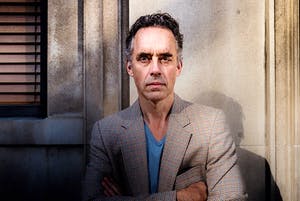For the poor souls who paid to live-stream the Jordan Peterson and Slavoj Žižek debate, the $15 ticket price must now seem like an act of grand larceny. In what was rather cringingly billed as the ‘debate of the century’—premature in 2019, if nothing else—the psychologist and bestselling author of 12 Rules for Lifeshared a stage in Toronto with the world’s most idiosyncratic philosopher and critic. The topic was ‘Happiness: Capitalism vs. Marxism’.
Of course, neither Peterson nor Žižek are strangers to crowds. Since rising to fame by opposing what he calls ‘compelled speech’, Peterson has become something of an icon for young conservatives, and a kind of paternal figure, offering practical wisdom to his legion of devoted followers. For David Brooks, he is ‘the most influential public intellectual in the Western world right now.’
Žižek, by comparison, is an old hand in the ideas business. For three decades he’s been writing two or three books a year and giving talks in five languages, all of them coloured by his eccentric style and sense of humour. He is a Marxist or ‘post-Marxist’, strongly influenced by Jacques Lacan. One YouTube commenter called him ‘Cocaine Hegel’. He continues to keep a picture of Joseph Stalin on the wall of his home ‘just to annoy people’.
Both are considered controversial. Their debate, then, should have made for an entertaining and spirited exchange of views. But what followed their grand arrival on stage (after a little Vivaldi, naturally) was underwhelming, to say the least.
Peterson gave a short critique of The Communist Manifesto. Žižek discussed political correctness and China. There were a handful of anecdotes anyone familiar with the pair will have heard before. And it wasn’t too long before they had agreed ‘deeply’ that happiness is not a ‘valid goal of human action’. You do wonder if they might have let the event-organiser know this in advance.
In short, the debate lacked bite. In an age of deep polarisation, here were figures from the left and the right, given several hours in front of a vast audience to assert their ideas and challenge those of the other. Yet by and large when they weren’t at cross-purposes, they were in agreement, not only on the apparent insignificance of happiness but on other contentious ideas—for instance, that capitalism needs regulation.
Debate is competitive, or ought to be. The purpose, after all, is to win the thing, preferably by presenting the superior argument. During his very first debate at the Oxford Union, Hilaire Belloc was so dismayed by the case set out by one side that he rose from his seat in the audience to give a more muscular defence of the position. He won the debate and was later elected president of the Union. H. G. Wells would say that debating Belloc was like ‘arguing with a hailstorm’.
But the competitive element of debate also brings ideas to life and the best out of those involved. This is partly what made Firing Line so engaging: the languid William F. Buckley, Jr., clipboard in hand, would take on all comers from Muhammad Ali to John Kenneth Galbraith. He had something to say, and say confidently, on Vietnam, economics, press freedom.
It was Buckley, and his brilliant personal nemesis Gore Vidal, who fought for the soul of America in the televised debates in the 1960s. Their disagreements—captured brilliantly in the 2015 documentary Best of Enemies—made good television, but they were also compelling and memorable.
You don’t have to try too hard to find more recent examples of debates made more captivating but the friction generated by the participants. Nick Clegg stole a victory at the first televised leaders’ debate in the history of British politics by condemning the two major parties and presenting himself as the alternative. (How things change.)
There was much to enjoy, too, in George Galloway’s lively debate with Christopher Hitchens on the Iraq War, since called, with due modesty, the ‘Debate of the Decade’. Indeed Hitchens, per YouTube, furnishes us with some of the best debates of the past 20 years. His combative style brought the best arguments out of his opponents and make his and theirs vivid.
There’s a telling clip taken from a debate between Christopher Hitchens and his brother, Peter. Having already corrected his sibling’s recital of Kipling’s ‘Recessional’ and very much in his stride, the older Hitchens takes an audience member to task for suggesting Stalinism was irreligious. After several minutes, the chair steps in. ’Please, civility,’ he says. ’Civility is overrated,’ Hitchens shoots back.
It was this that came to mind as Peterson and Žižek left the stage. They were, put simply, too civil. And the outcome was a debate in which much was said but little seemed to matter. It was a debate, in other words, that never really was one.






Comments